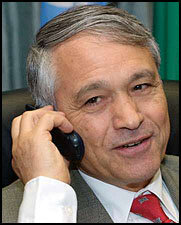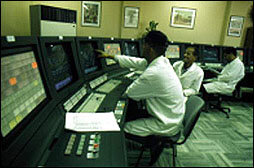
| 
 Introduction - Privatization - Partnerships - Investment - Oil and Gas - Mining - Introduction - Privatization - Partnerships - Investment - Oil and Gas - Mining -
Electricity - Building for the future - Telecoms - Air and Sea - Private Sector - Finance -
Going Public - Image is everything - Tourism - Conclusion 
 ALGERIA´S BLACK GOLD INVESTMENT OPPORTUNITIES ALGERIA´S BLACK GOLD INVESTMENT OPPORTUNITIES |
Algeria has undoubtedly prospered thanks to its incredible oil and gas reserves. However, it is known that the predominance of hydrocarbons in Algeria's economy is contributing to its fragility.

" Algeria is reestablishing touch with business ", contentedly declares Chakib Khelil, Algerian Minister for Energy and Mines, who is in charge with the mission to develop this sector towards new heights and partnerships.
Indeed, Khelil' s mission is extremely delicate, given the strategic importance of this sector and the revenues that allow the economy of the country to thrive. For the year 2000, out of the US$ 20 million in hydrocarbon export sales, US$ 13 million supplied the foreign currency reserves. This amount will partly be allocated to the servicing of the debt (US$ 5.61 million), the food bill (US$ 2.5 million), and to the payment of imported goods, services and equipments. Moreover, stability within the oil market has enabled the Algerian government to increase public sector investment by 17.3%.
There is, however, a downside to Algeria's independence on the petroleum sector. Since 96% of the country's revenues are generated by the export of hydrocarbons, the economy has by extension become highly sensitive to fluctuations within the oil market. After the enthusiasm of the seventies when a barrel was worth US$ 40, this dependence was bitterly felt with the price of the barrel collapsing in the mid eighties. The country fell into recession and its external debt almost doubled from US$ 18.4 million to US$ 28.6 million between 1985 and 1989. It became evident that before even adopting structural adjustment therapies, Algeria's only solution was to increase its oil revenues by developing its exploration and exploitation capacities.
| Ever since its decision in 1971 to nationalize the hydrocarbon sector, the government has maintained a monopoly on all oil activities. Later, with the introduction of limited partnerships in 1986, and the Ghozali Law in 1991, foreign corporations were increasingly able to enter the industry via research and development partnerships with the national petroleum company Sonatrach. These new laws enabled Algeria to enhance its revenues by signing contracts with over thirty companies (mostly Americans) specialized in the exploration and development of gas and petroleum resources.

Although the Algerian constitution still uphold State control of the energy and mining sector, the government is preparing what is called "second generation reforms" - a legislative package favouring private (especially foreign) investments within the energy and mining sector from 2001 to 2005. "In the past explains Khelil everything was strategic - mines were strategic, electricity was strategic, petroleum was strategic... But concepts have changed. Today, our greatest strategic element lies in our human resources".
|
© World INvestment NEws, 2001.
This is the electronic edition of the special country report on Algeria published in Forbes Global Magazine. 12th November, 2001 Issue.
Developed by AgenciaE.Tv Communication |
|
|
| |
| | | |
|

